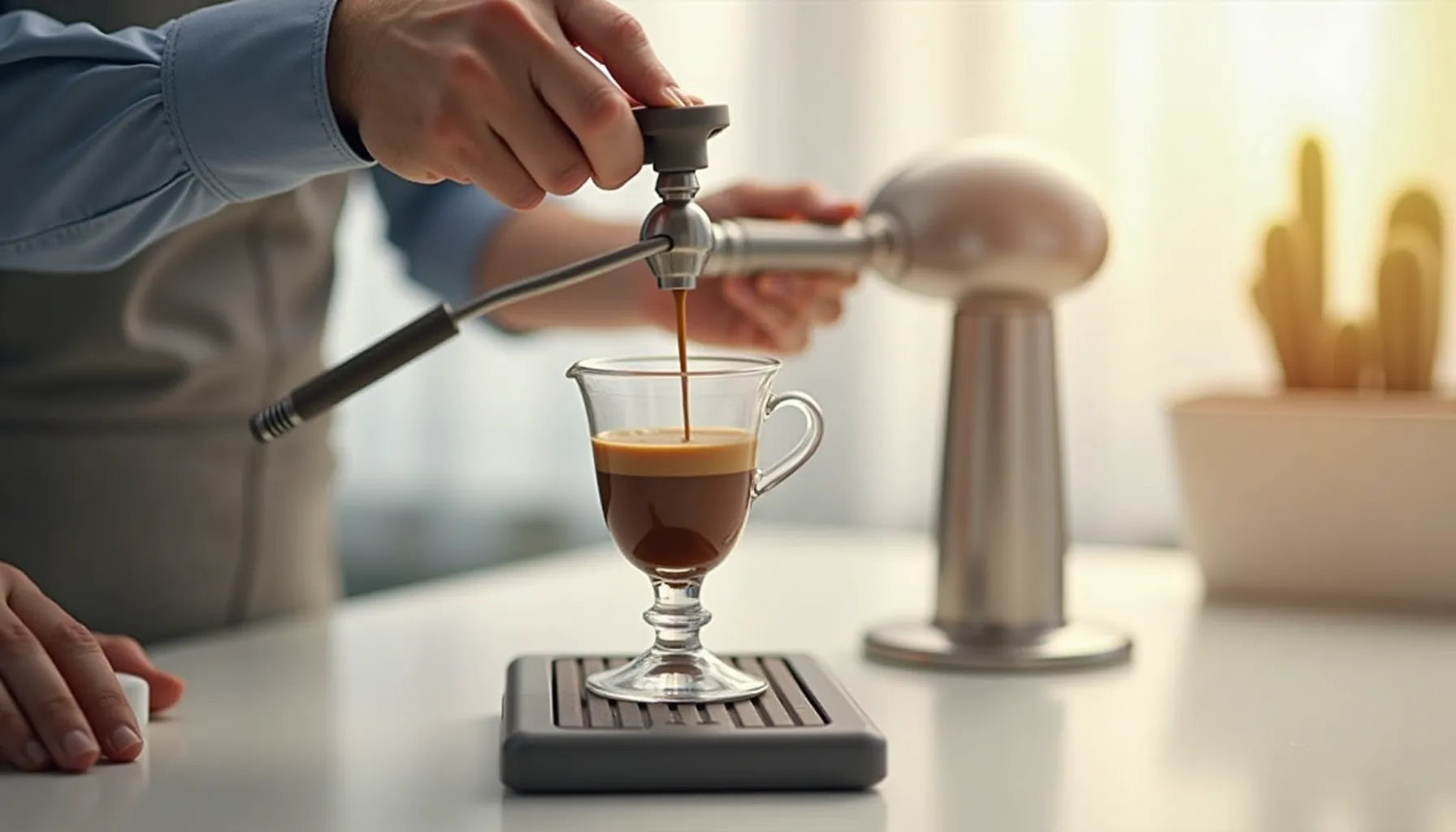Creating a coffee shop business plan template is essential for anyone dreaming of starting their own café. As the coffee industry evolves, having a well-structured plan not only keeps you organized but also highlights your unique vision to potential investors. This article will guide you through the vital components of a solid business plan that can turn your coffee shop dream into a reality.
Key Takeaways:
- Understand Market Trends: Stay informed about the latest trends in the coffee industry to capitalize on opportunities.
- Craft a Clear Executive Summary: Your mission statement should resonate with your values and goals.
- Focus on Detailed Market Analysis: Know your target audience and competitor landscape to make informed decisions.
- Develop a Comprehensive Marketing Strategy: Use both digital and traditional tactics to attract customers.
- Prepare Solid Financial Projections: Outline startup costs and revenue forecasts to secure funding.

Understanding the Coffee Shop Industry Landscape
Market Trends
The coffee shop industry is buzzing with opportunity, especially as consumer preferences shift towards specialty coffees and artisanal experiences. In recent years, the U.S. coffee market has grown steadily, with a significant rise in gourmet and locally sourced brews. This evolution presents both challenges and opportunities for newcomers looking to carve out their niche in a crowded marketplace.
It's crucial to stay informed about shifts in the industry. From the increasing demand for organic coffee to the popularity of unique brewing techniques, understanding these trends can help shape your coffee shop's offerings and marketing strategy. Keeping an eye on emerging coffee shop concepts allows you to differentiate yourself and meet customer expectations.
Target Audience Analysis
Identifying your target audience is one of the vital steps in crafting a successful coffee shop business plan. Will your cafe cater to busy professionals needing a quick caffeine fix, students searching for a cozy study spot, or families enjoying a weekend outing together? Each demographic has distinct preferences, and your strategy should reflect that.
Consider conducting surveys or informal interviews to gather insights about customer needs and preferences in your chosen location. Engaging with your community can also help you identify gaps in the market and tailor your offerings to perfectly suit your audience.
Crafting the Coffee Shop Business Plan
Executive Summary Essentials
Your executive summary is your business plan's first impression, setting the tone for how prospective investors or partners perceive your venture. This part should be a concise, engaging snapshot of your coffee shop’s mission, vision, and core values. Aim to evoke excitement about your concept and clearly articulate what makes your coffee shop unique.
Don't forget to summarize your business model and target audience. Whether you’re focusing on sustainable practices or exceptional customer service, highlighting these elements fosters an emotional connection with your reader and establishes the groundwork for the rest of your plan.
Business Description Breakdown
Elaborate on the core concept of your coffee shop in the business description. This section should not only explain what your business is but also the inspiration behind it. For instance, are you planning to open a trendy café that serves unique blends, or perhaps a cozy spot specializing in organic teas and pastries?
Articulating your vision and showing enthusiasm for your concept helps paint a vivid picture for potential investors, allowing them to visualize what you hope to achieve. Incorporate your unique selling propositions and how you plan to stand out amidst the competition.
Detailed Components of Your Business Plan
Market Analysis Deep Dive
A thorough market analysis is crucial for your coffee shop business plan. Start by conducting a comprehensive examination of your local coffee scene. Identify key competitors and assess their strengths and weaknesses. What do they do well? Where do they fall short?
Your competitor insights will provide valuable context as you craft your strategy. By pinpointing gaps in the market, you can tailor your offerings to meet unmet needs, positioning your coffee shop as a compelling alternative.
Customer Segmentation
Defining your ideal customer profile is essential for effective marketing and product offerings. Take the time to explore various customer segments that align with your concept. Are you focusing on eco-conscious millennials, college students, or busy parents?
Understanding these segments will allow you to create targeted marketing campaigns that resonate with each group. By diving into their preferences and pain points, you can design an experience that not only attracts them to your coffee shop but keeps them coming back for more.
Developing a Winning Marketing Strategy
Identifying Your Brand
Your brand is much more than just a logo; it embodies the personality and ethos of your coffee shop. Crafting a captivating brand that resonates with your target audience is essential. Start by defining what you stand for—sustainability, quality, community, or creativity.
Engage with your audience through storytelling; share your journey, what inspires you, and what differentiates your coffee shop from others. Invest time in designing your visual identity, from color palettes to typography. This consistency creates a memorable experience that keeps customers returning. Brand identity should be reflected in everything from your packaging to your staff's uniforms.
Promotional and Advertising Techniques
Now that your brand is set, it’s time to roll out your marketing strategy. Utilize both digital and traditional methods to maximize your reach. On social media, platforms like Instagram and Facebook are perfect for showcasing your ambiance, menu items, and customer interactions. Engaging visuals and authentic content will help build a loyal following.
Don’t stop there; consider grassroots marketing efforts by collaborating with local businesses or hosting community events. These strategies foster connections and create a sense of belonging, making your coffee shop a staple in the neighborhood.
Financial Projections: Making Sense of the Numbers
Startup Costs Overview
One of the most critical aspects of your coffee shop business plan is understanding your startup costs. Clearly outlining these expenses can make or break your venture. Begin by listing all necessary investments, such as equipment (espresso machines, grinders), renovations, furniture, and initial inventory.
Be thorough; don’t forget about licenses, permits, and marketing expenses. It’s wise to create a spreadsheet to help you visualize these costs and keep track of your budget. Estimating startup costs accurately will provide a more realistic roadmap for your financial expectations and funding requirements.
Revenue Projections and Financial Planning
Next, dive into revenue projections. While this part can feel daunting, having a clear forecast helps you set achievable goals. Start with an analysis of your pricing strategy and expected sales volume. Consider how many customers you’ll need to serve daily to break even or turn a profit.
Additionally, developing detailed cash flow statements and income statements will provide invaluable insights into the financial health of your business. This information is crucial for potential investors, as they’ll want to see a solid plan for profitability over time.
Finalizing the Business Plan and Seeking Funding
Funding Request Essentials
Your funding request is a vital section of your business plan. Here, you must clearly articulate how much capital you need and what it will be used for. It’s essential to provide a detailed breakdown of your financial requirements, linking back to your startup costs and demonstrating your understanding of where every dollar will go.
Investors want assurance that their funds will be employed effectively to help your coffee shop thrive. Emphasize strategic spending—whether for pivotal equipment or marketing initiatives—that will drive growth and customer engagement.
Pitching Your Business Plan
Finally, it's time to present your business plan to potential investors or lenders. A confident and engaging pitch can significantly influence their decision-making process. Make sure to highlight your unique concept, market potential, and the solid financial projections you've outlined.
Prepare for questions and concerns, and practice your delivery. Show your passion for your coffee shop and connect emotionally; investors often back people as much as ideas. With a compelling pitch and solid preparation, you’ll increase your chances of securing the funding you need to turn your coffee shop dream into a reality.

Brewing Your Future
As you embark on the exciting journey of starting your coffee shop, remember that a well-crafted business plan is your best ally. It’s not just a document to attract investors; it’s a blueprint for your dreams and the foundation for your success. Each section—from market analysis to financial projections—serves a critical role in shaping your business strategy.
But beyond just the numbers and strategies, think about the heart of your café. Embrace the uniqueness that your shop will bring to the community, focusing on connection as much as coffee. Providing exceptional customer experiences and staying adaptable to industry trends will be key to thriving in the competitive landscape. Remember, the world of coffee is ever-evolving, and so should your business strategy. Always keep your vision at the forefront as you navigate challenges and celebrate successes along the way. Your passion for coffee can turn into a beloved community hub that resonates with many!
FAQs About Coffee Shop Business Plans
What are the essential components of a coffee shop business plan?
A strong business plan typically includes an executive summary, business description, market analysis, organizational structure, marketing strategy, financial projections, and funding requests.
How do I know my coffee shop's target audience?
Identifying your target audience involves understanding demographics in your area, conducting surveys, and analyzing market trends to discern who will benefit most from your offerings.
What are some effective marketing strategies for my coffee shop?
Effective strategies include leveraging social media for promotions, hosting community events, forming partnerships with local businesses, and creating a strong brand identity that resonates with customers.
How can I estimate my coffee shop's startup costs?
List all potential expenses, such as equipment, renovations, initial inventory, and legal fees. Use realistic estimates and research to create an accurate budget that covers all necessary expenses.
Why is financial projection important for my coffee shop?
Financial projections help you set realistic expectations for income and expenses. They also play a crucial role in securing funding, as they provide investors insight into your business’s potential profitability.












